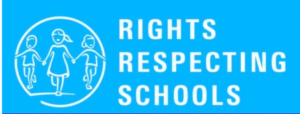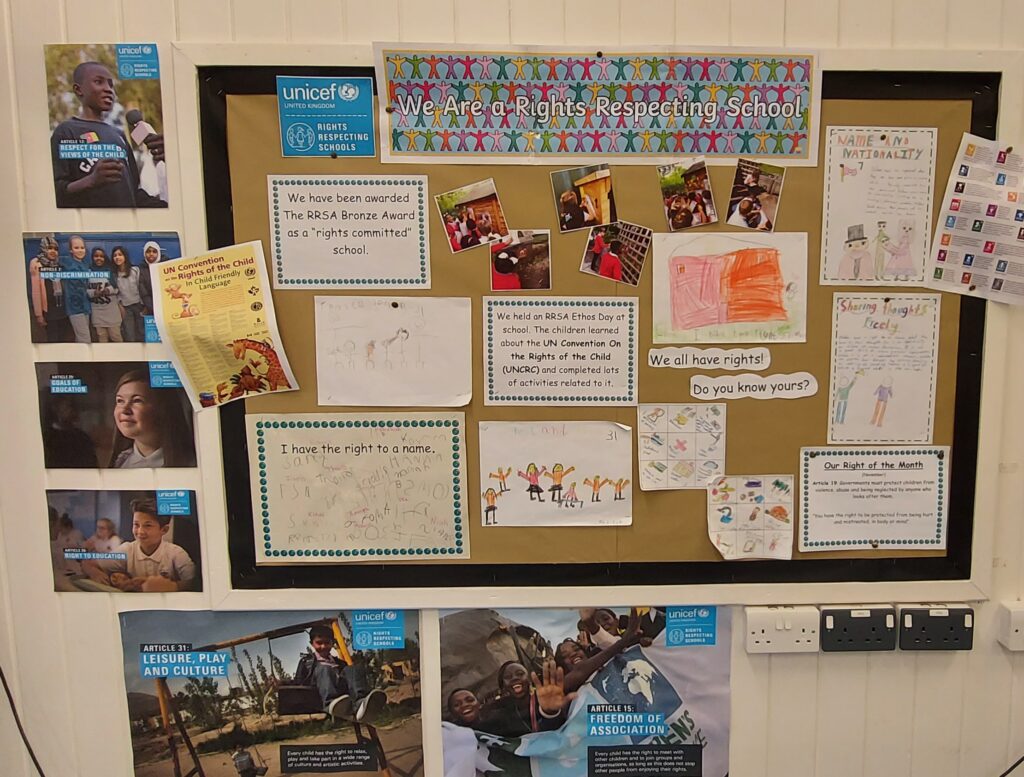Curriculum

RIGHTS RESPECTING SCHOOL AWARD
RSSA lead – Mrs Abela
At St.Clement’s, we are committed to the UN Convention on the Rights of the Child (UNCRC). Click this link to see a summary of the UNCRC.
We learn about rights, through rights and for rights.
What is the focus of RRSA?
The UNICEF UK Rights Respecting Schools Award supports schools across the UK to embed children’s human rights in their ethos and culture.
The Award recognises achievement in putting the UN Convention on the Right of the Child (CRC) at the heart of a school’s practice to improve wellbeing and help all children and young people realise their potential.
The Award is based on principles of equality, dignity, respect, non-discrimination and participation. The initiative started in 2006 and schools involved in the Award have reported a positive impact on relationships and wellbeing, leading to better learning and behaviour, improved academic standards and less bullying.
We all have rights! Do you know yours?
RRSA News:
We are pleased to announce we have gained our Silver RSSA award this June! A huge well done to everyone involved! Please see our accreditation below:
St Clements PS RRSA Silver Accreditation Report
In July 2021 our school was awarded The RRSA Bronze Award as a “rights committed” school.
We held an RRSA Ethos Day at school. The children learned about the UN Convention on the Rights of the Child (UNCRC) and completed lots of activities related to it. Our school Ethos team helped to plan and lead activities.

RRSA Articles/Rights of the Month-
These are promoted through assemblies and other themes we are addressing as a school.
AUTUMN TERM:
SEPTEMBER

Article 12 of the Convention establishes the right of every child to freely express her or his views, in all matters affecting her or him, and the subsequent right for those views to be given due weight, according to the child’s age and maturity.
“You have the right to give your opinion, and for adults to listen and take it seriously”.
OCTOBER- (Link to Black History Month)

Article 2- The Convention applies to everyone: whatever their race, religion or abilities, whatever they think or say, whatever type of family they come from.
“All children have these rights, no matter who they are, where they live, what their parents do, what language they speak, what their religion is, whether they are a boy or girl, what their culture is, whether they have a disability, whether they are rich or poor. No child should be treated unfairly on any basis”.

Article 30- Every child has the right to learn and use the language, customs and religion of their family, regardless of whether these are shared by the majority of the people in the country where they live.
“You have the right to practice your own culture, language and religion – or any you choose. Minority and indigenous groups need special protection of this right”.

NOVEMBER- Article 19 (Anti-Bullying Week) Governments must protect children from violence, abuse and being neglected by anyone who looks after them.
“You have the right to be protected from being hurt and mistreated, in body or mind”.
DECEMBER– (Human Rights Day)

Article 4- Governments must do all they can to make sure that every child in their countries can enjoy all the rights in this Convention “The government has a responsibility to make sure your rights are protected. They must help your family to protect your rights and create an environment where you can grow and reach your potential”.

Article 41- If the laws of a country protect children’s rights better than this Convention, then those laws should be used. “If the laws of your country provide better protection of your rights than the articles in this Convention, those laws should apply”.
We continued our journey in learning about our Rights. As part of our worship we focussed on themes such as “Everyone’s a Hero” (Anti-Bullying- Article 19) and World Children’s Day- Articles 4 and 14.
The Ethos team delivered a Diwalli assembly where we shared the message that “You have the right to choose your own religion and beliefs”- Article 14
Some classes began their Class Rights Charters identifying which rights are most important to them as a group.
SPRING TERM:
This term we will be continuing to work on and use our Class Rights Charters.
We will be communicating our Rights and the Month and relevant articles more widely via Class Dojo.
Our Rights assembly themes will focus on:
The Displacement Cycle, Migration and How it Benefits Society, Martin Luther King Day.
January- World Religion Day

Article 2 (non-discrimination) The Convention applies to every child without discrimination, whatever their ethnicity, sex, religion, language, abilities or any other status, whatever they think or say, whatever their family background.
“All children have these rights, no matter who they are, where they live, what their parents do, what language they speak, what their religion is, whether they are a boy or girl, what their culture is, whether they have a disability, whether they are rich or poor. No child should be treated unfairly on any basis”

Article 14 (freedom of thought belief and religion) Every child has the right to think and believe what they choose and also to practise their religion, as long as they are not stopping other people from enjoying their rights. Governments must respect the rights and responsibilities of parents to guide their child as they grow up.
“You have the right to choose your own religion and beliefs. Your parents should help you decide what is right and wrong, and what is best for you.”
![]()
Article 30 (children from minority or indigenous groups) Every child has the right to learn and use the language, customs and religion of their family, whether or not these are shared by the majority of the people in the country where they live.
“You have the right to practice your own culture, language and religion – or any you choose. Minority and indigenous groups need special protection of this right”.
(February- Safer Internet Day)

Article 16 – the right to privacy
Every child has the right to privacy. The law should protect the child’s private, family and home life, including protecting children from unlawful attacks that harm their reputation.
“You have the right to privacy”

Article 17 – access to information from the media
Every child has the right to reliable information from a variety of sources, and governments should encourage the media to provide information that children can understand. Governments must help protect children from materials that could harm them.
“You have the right to get information that is important to your well-being, from radio, newspaper, books, computers and other sources. Adults should make sure that the information you are getting is not harmful, and help you find and understand the information you need.”
March (Link to World Book Day and Autism Awareness Month)

Article 17 – access to information from the media
Every child has the right to reliable information from a variety of sources, and governments should encourage the media to provide information that children can understand. Governments must help protect children from materials that could harm them.
![]()
Article 29 (goals of education)
Education must develop every child’s personality, talents and abilities to the full. It must encourage the child’s respect for human rights, as well as respect for their parents, their own and other cultures and the environment.
![]()
Article 31 (leisure, play and culture)
Every child has the right to relax, play and take part in a wide range of cultural and artistic activities.
![]()
Article 23 – (Children with disabilities) A child with a disability has the right to live a full and decent life with dignity, and as far as possible, independence, and to play an active part in their community.
Governments must do all they can to support disabled children and their families
April (Link to Earth Day/ Ukraine Conflict)
![]()
Article 38 (war and armed conflicts): Governments must not allow children under the age of 15 to take part in war or join the armed forces. Governments must do everything they can to protect and care for children affected by war and armed conflicts.
![]()
Article 39 (recovery from trauma and reintegration): Children who have experienced neglect, abuse, exploitation, torture or who are victims of war must receive special support to help them recover their health, dignity, self-respect and social life.
![]()
Article 6 (life, survival and development): Every child has the right to life. Governments must do all they can to ensure that children survive and develop to their full potential.
![]()
Article 24 (health and health services): Every child has the right to the best possible health. Governments must provide good quality health care, clean water, nutritious food, and a clean environment and education on health and well-being so that children can stay healthy. Richer countries must help poorer countries achieve this.
May- Link to RRSA Ethos Day (Campaign for Education)
![]()
Article 28 (right to education) Every child has the right to an education. Primary education must be free and different forms of secondary education must be available to every child. Discipline in schools must respect children’s dignity and their rights. Richer countries must help poorer countries achieve this.
![]()
Article 29 (goals of education) Education must develop every child’s personality, talents and abilities to the full. It must encourage the child’s respect for human rights, as well as respect for their parents, their own and other cultures, and the environment.
![]()
Article 23 (children with a disability) A child with a disability has the right to live a full and decent life with dignity and, as far as possible, independence and to play an active part in the community. Governments must do all they can to support disabled children and their families.
SUMMER TERM
June – World Refugee Day/Month, Child Labour Day and Child Safety Week.
Here are our articles of the month. Some of the Ethos Team helped to deliver an assembly this week on child labour and how many children in the world are needed or forced to work in conditions that are unsafe and that they are unable to access their rights to education as a result.
![]()
Article 19 (protection from violence, abuse and neglect) Governments must do all they can to ensure that children are protected from all forms of violence, abuse, neglect and bad treatment by their parents or anyone else who looks after them.
![]()
Article 22 (refugee children) If a child is seeking refuge or has refugee status, governments must provide them with appropriate protection and assistance to help them enjoy all the rights in the Convention. Governments must help refugee children who are separated from their parents to be reunited with them.

Article 32 (child labour) Governments must protect children from economic exploitation and work that is dangerous or might harm their health, development or education. Governments must set a minimum age for children to work and ensure that work conditions are safe and appropriate.
July- Links to Sports Day, our overall knowledge of rights.
![]()
Article 42 (Knowledge of Rights) Governments must actively work to make sure children and adults know about the Convention. The Convention has 54 articles in total.
![]()
Articles 43–54 are about how adults and governments must work together to make sure all children can enjoy all their rights.
![]()
Article 31 (Focus on Sport) (leisure, play and culture) Every child has the right to relax, play and take part in a wide range of cultural and artistic activities.
To find out more please visit:

